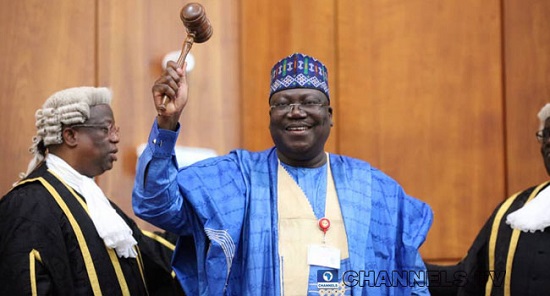The Senate, yesterday, bowed to outrage and outright rejection of the 2021 Amended Electoral Act by Nigerians earlier in July as they upturned their position against electronic transmission of election results.
In a majority decision, they have now given the Independent National Electoral Commission (INEC) full powers, like voting, under the bill, shall now be in accordance with the procedure determined by INEC.
The Senators had earlier denied the Commission the power to transmit results of elections electronically but rather empowered the Nigerian Communications Commission (NCC) and the National Assembly to determine the use of electronic transmission for elections; though the lower chamber was more circumspect in dealing with clause 52(3), leaving electronic transmission of results in the hands of INEC.
Thereafter, the Senate President instituted a conference committee, which shall meet to harmonise the various reports of both chambers on electronic transmission.
The Senators during the consideration of what they referred to as recommittal of amended clauses for an act to repeal the Electoral Bill 2021, No. 6, and enact the Electoral Act 2021, yesterday, adopted the position of the lower chamber.
ON the nomination of candidates by political parties, the Senate also adopted the resolution of the lower chamber, which recommended direct primary.
The Senate, when it passed the Electoral Act amendment on clause 87, had left it open for political parties to determine whether to use direct, consensus or indirect primary. However, while considering the report of the conference committee yesterday, they also adopted the position of the House.
In all, the Senate passed a new bill, which amended some clauses in the Electoral Bill, including sections 52 and 87 on electronic transmission of results and nomination of candidates by political parties.
The controversial clause 52(3) is now amended to 52(2), which reads: “Subject to section 63 of this Bill, voting at an election and transmission of results under this Bill shall be in accordance with the procedure determined by the Commission (INEC), which may include electronic voting.”
This is against the previous wording of the paragraph, which was changed from: “The Commission may transmit results of elections by electronic means where and when practicable,” to “the Commission may consider electronic transmission provided the national network coverage is adjudged to be adequate and secure by the Nigerian Communications Commission and approved by the National Assembly.”
On the nomination of candidates by parties, the Senate had earlier passed clause 87(1), which allows parties to hold either direct or indirect methods of conducting primaries.
The clause is now amended to read: “A political party seeking to nominate candidates for elections under this Bill shall hold direct primaries for aspirants to all elective positions, which shall be monitored by the Commission.”
In a motion to recommit some clauses in the bill, the Senate Leader, Abdullahi Yahaya, who sponsored the bill, asked that the Senate “rescind its decision on the affected clause of the bill as passed and recommit same to the committee of the whole for consideration and passage.”
He said after a critical examination of the bill by the Senate Committee on INEC, some fundamental issues, which required fresh legislative action on Clauses 43, 52, 63 and 87 were observed.
He said there was a need to address the observations by the committee and make necessary amendments relying on Order 53(6) of the Senate Standing Order.
This Order allows the Senate to reconsider the substantive motion for rescission.
The amended clauses now read: Clause 43(1) – The commission shall provide suitable boxes, electronic voting machines or any other voting device for the conduct of elections.



